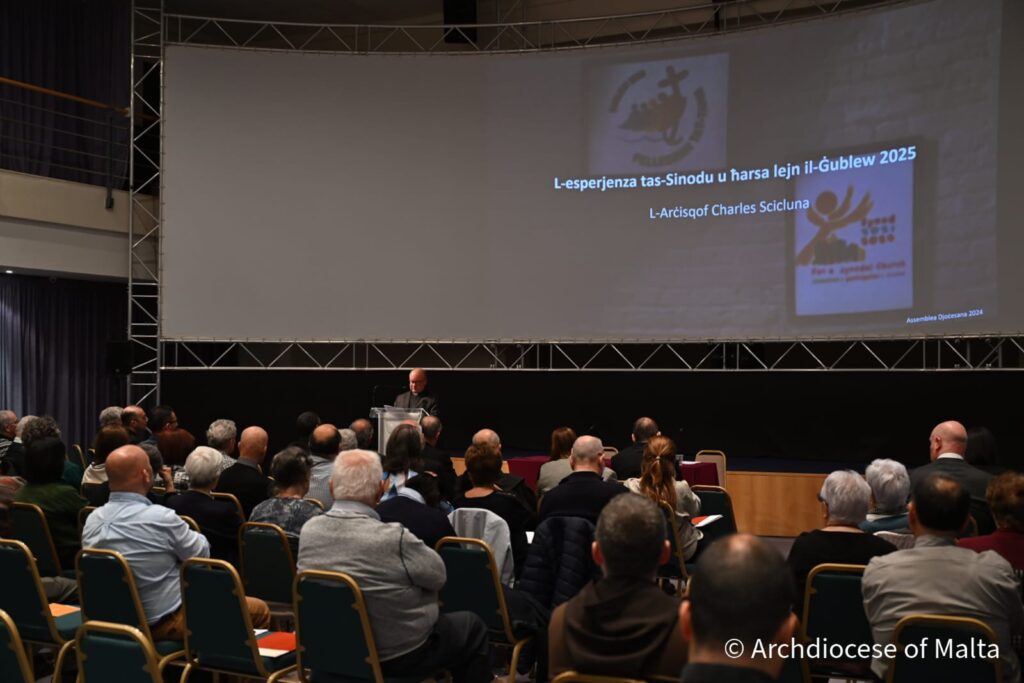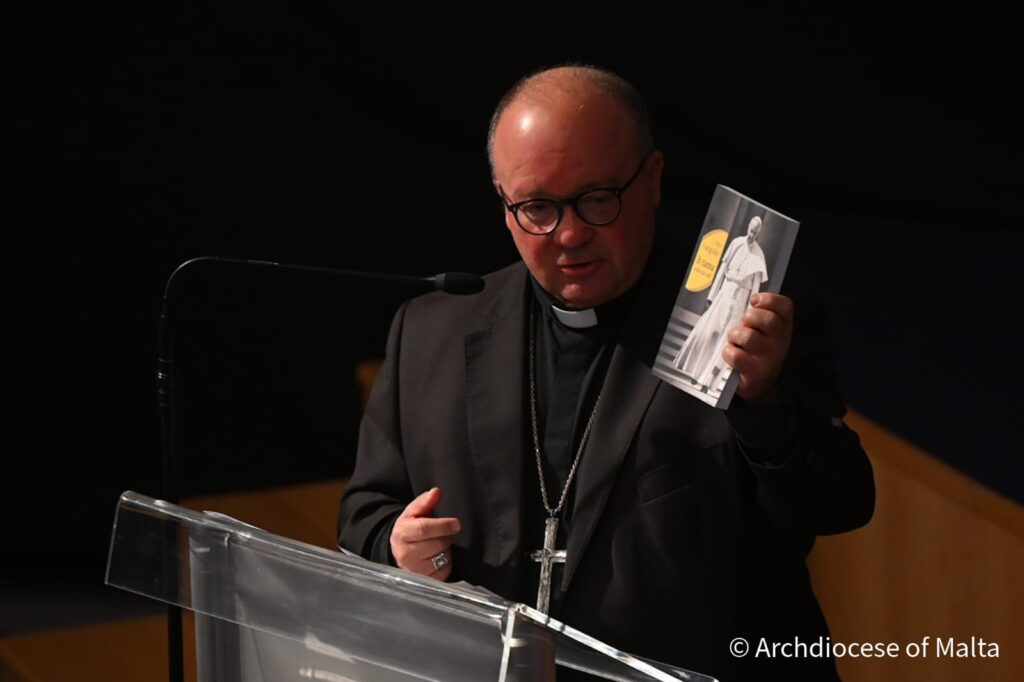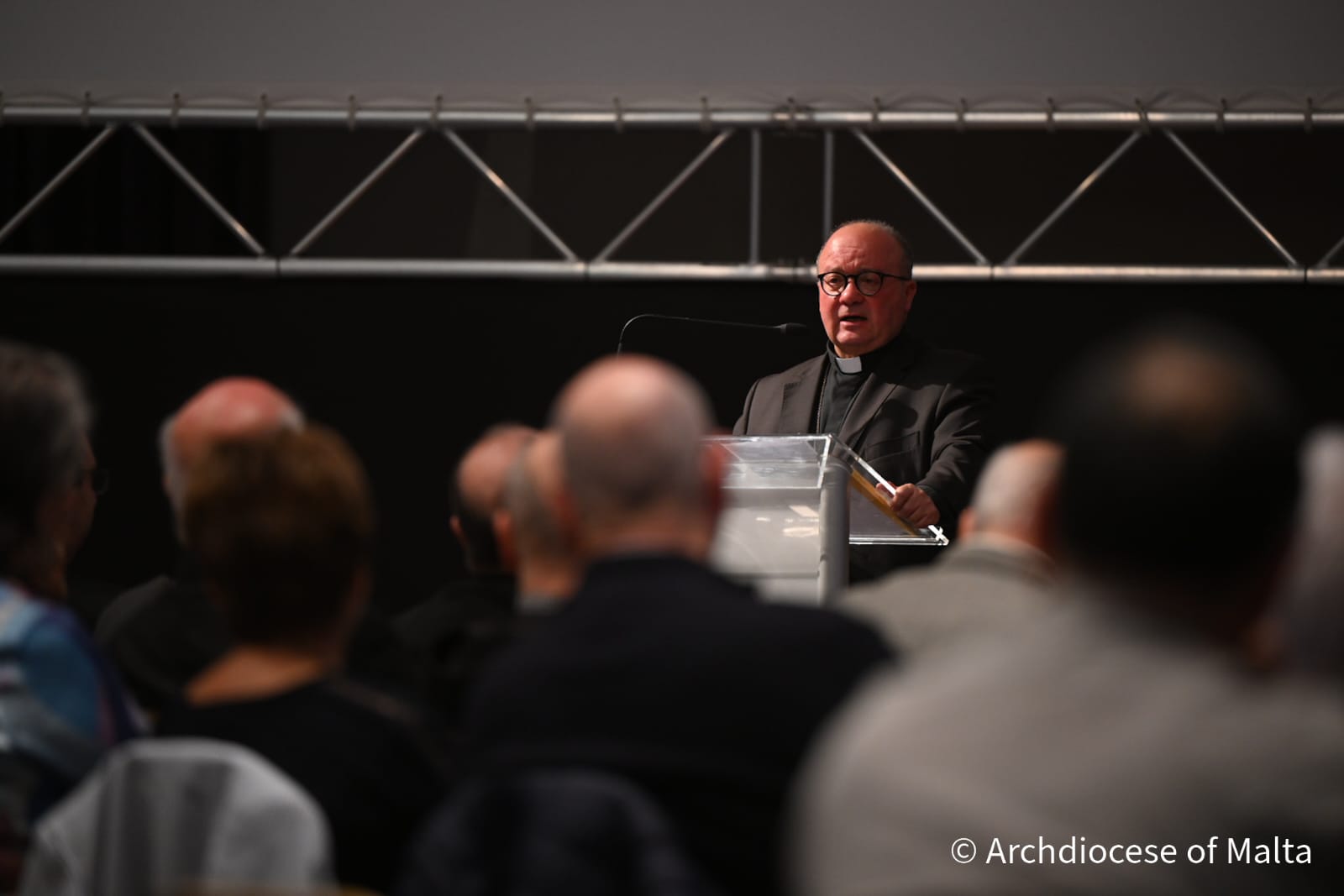
Message by Archbishop Charles Scicluna
This address to the Diocesan Assembly gives me the opportunity to share with all of you the spirit of two important ecclesial events from 2024 and to look forward with you towards the Holy Year 2025.
The first ecclesial event that marked our experience as the Church in Malta, as the People of God pilgriming in Malta, was the Ad Limina visit of the Bishops of Malta and Gozo in May 2024. As you may know, the last time this had happened was in 2012, twelve years ago. For us bishops it was the first Ad Limina visit in our episcopal ministry. We had the opportunity to engage in fruitful dialogue with the major dicasteries of the Holy See.
I am grateful for the work of so many of you here today who contributed generously to the preparation of the 200-page report on the reality, activities, blessings and challenges of the Archdiocese.
We prayed on the tombs of the Apostles Peter and Paul, at Santa Maria Maggiore and the Cathedral of Rome, St John Lateran. We renewed our commitment to our faith and our ministry, we carried the aspirations and hardships of our peoples to the Thresholds (Ad Limina) of these sacred places of worship and charity.
The Holy Father insisted that our ministry should witness to the demands of mercy.
The highlight of our visit was our meeting with the Holy Father, Pope Francis. He remembers fondly his visit to our islands and our Churches. The Holy Father was well-informed. He encouraged us to work for vocations to the priesthood and the religious life; to support a culture that respects human life and human dignity from conception to natural death. The Holy Father insisted that our ministry should witness to the demands of mercy. He repeated several times: “misericordia, misericordia!”
The second important ecclesial event of 2024 was the Second Session of the Synod of Bishops on Synodality, held in October. There are a number of takes that I cherish from the experience of the Synod. The first one was the spirit of dialogue facilitated by the fact that all 350 members of the Assembly were gathered at round tables of 12 people. Each table included a facilitator and participants were carefully chosen to represent a cross-section of the Assembly, based on one’s role in the Church and one’s geographical origin.
There were five official languages at the Synod, but the unique experience of engaging in spiritual conversation brought all language groups together. We were blessed with the spiritual meditations of Cardinal-elect Fr Timothy Ratcliffe OP and the presence of the Holy Father at all general assemblies.
I am very grateful that the Holy Father decided to promulgate the final document, produced and approved by the Synod, as the definitive document that marks this experience. A document is a document; it is not a magic wand. It will not transform minds and hearts on its own. But it is a starting point, a means to an end, the fruit of candid discussions and a prophetic vision that has to imbue our being Church in fidelity to our faith in hope and love. We have now entered the third phase of the synodal journey dedicated to implementation. A number of working groups are helping the Holy See discern on specific topics that could not be tackled during this last session of the Synod of Bishops, and we will follow their contribution with interest and in communion with the Holy Father.
… we need to count our blessings as we learn to listen to each other in a spirit of freedom, humility, courage and mutual trust.
As I was sharing my reflections and experience with my synodal companions I came to realise how blessed our archdiocese is with a number of fora for discussion and sharing. I am not saying that everything moves like clockwork, but we need to count our blessings as we learn to listen to each other in a spirit of freedom, humility, courage and mutual trust.
The Archdiocese of Malta was profoundly blessed by the experience of the Diocesan Synod held 25 years ago. We need to revisit that experience and reconnect with the enthusiasm generated at the turn of the millennium by the prophetic decision of the late Archbishop Joseph Mercieca. I would like to recognise the contribution of now Auxiliary Bishop Joseph Galea Curmi in facilitating that extraordinary experience and in furthering it during these last years as my fellow companion and successor of the Apostles.

When we bishops asked the Holy Father, in our meeting with him on 17 May 2024, what his wish for the Holy Year 2025 was, he said: “Una grande festa di misericordia!” (A huge feast of mercy). We all know that the Holy Year, that will be inaugurated in the local Churches on 29 December 2024, has also been named as the Year of Hope. To better understand the intention and the heart of the Holy Father on this theme, we have published all his catechesis on the virtue of hope in Maltese and I am very pleased to give each one of you a complimentary copy. I would like to thank Francesco Pio Attard of Gozo for the translation and Fr Paul Darmanin OFM Conv. for the publication.
The teaching of the Holy Father on Hope should guide us as we celebrated the Holy Year, gathered as a diocese and in different groups according to category. But as the Holy Father told us bishops in no uncertain terms, we will be a sign of hope to our contemporaries to the extent that we become witnesses of the mercy that the Lord has show and continues to show with each and every one of us. We are all “misericordiati”, to quote a neologism introduced by Pope Francis. We have all found mercy. And it is mercy that transforms us from being hopeless to being hopeful.
Its ethos of care and stewardship has been a source of hope and direction for our people. Our duty is to ensure this continues to be the case.
The Holy Year is a time to stop to say thank you for our many blessings. The Church in Malta down the centuries has been and still is a witness to a heartfelt proximity to our people. This is the glory of the Church in Malta and Gozo. Its ethos of care and stewardship has been a source of hope and direction for our people. Our duty is to ensure this continues to be the case.
We are a faith community rich in both religious and human heritage. We are also called to cherish a tradition of care and pioneering efforts responding to the needs of the people: from homes for children and the elderly, to a community centre (Caritas), to support for palliative care (St Michael Hospice/Adelaide Cini); to feeding the hungry (food bank and soup kitchens); to the promotion of the development and empowerment of young people with disability (Dar Saura). These are all concrete and actual examples of the spirit that drives the Church in Malta.
The Church in Malta strives to bring the Gospel of Life and Love by committing itself to its mission of the Word and its mission of Service through many initiatives that demand constant formation and training of personnel, continued upgrading and funding of resources and services.
To this end, and at the service of its mission and the common good, the Church in Malta is bound to exercise due diligence in the stewardship of financial means and the care of its cultural heritage.
After the 1992 Church-State agreement, the Church divested itself of most of its landed property at a ‘social’ price in favour of the State. As a consequence, financial investments became the backbone of its stewardship of wealth and the only method to guarantee the necessary sustenance of the clergy, ensures the livelihood of its lay employees, the furthering of its pastoral initiatives, the maintenance of its churches, the commitment to provide schooling for our children, shelters for the vulnerable, and food for those — whose numbers are growing — in need.
The Holy Father reminded us just a few days ago that the Church is not separate from the poor. But he said, “The reality is that we become the Church of Jesus to the extent that we serve the poor”.
The Pope encouraged the faithful also to pay attention to how they live each day, being attentive to their lifestyle and the environment, and to “a tenacious pursuit of justice, dedication to sharing our goods with those who are poorer and the social and political commitment to improving reality around us.”
What matters, what has always mattered, is how it uses that money, and that it ensures this money reaches those who need it most.
The reality the Pope speaks of can only be achieved if the Church has the means to help the poor: through its vocation to serve, through gifting its property, and, yes, through the income it is capable of generating. The Church in Malta has amassed funds from various sources for many years. There is nothing wrong with that. What matters, what has always mattered, is how it uses that money, and that it ensures this money reaches those who need it most.
I extend my gratitude to Archbishop Joseph Mercieca for his decision, made years ago, to publish the Archdiocese’s annual accounts, providing the people of God with transparency about the source of the funds and how they are utilised. This is a matter of accountability—a tradition we uphold.
I believe that if the Church cedes its role as a giver, perhaps to big business, it would be failing in its duty to the People of God, reneging on its responsibilities, and losing its relevance — its raison d’etre — in society.
In recent weeks, several comments were made about APS Bank.
As the majority shareholder of APS, which for the past two years has been a publicly listed company and therefore subject to strict market rules and regulations, the Archdiocese is bound by law not to entertain comments or public discourse that could impact the financial market. This is the law and we must observe the law. What I will say is that unlike some have suggested, this matter is very far from being a fait accompli.
There are also a few points I wish to make:
Firstly, let us not forget that there was never a decision by the Church to form or own a bank. The Archdiocese of Malta inherited the activities of the Unione Cattolica San Giuseppe (previously, Lega dell’Appostolato della Preghiera) in 1947, after the Unione’s operations had been hampered by World War II. Thereafter, the Apostleship of Prayer Savings Bank (APS) was licensed by the Central Bank of Malta and has operated in an ethical manner and without controversy for the past 50 years.
Let us also not forget that the Church in Malta and Gozo has taken important decisions that have marked the identity of APS as a commercial bank recently quoted on the financial market.
Throughout its history, APS has played an important role in the Archdiocese’s responsible and forward-looking stewardship.
Furthermore, the Archdiocese has:
- promoted the status of APS as an ethical bank with a reputable and client-centred ethos;
- exercised vigilance in a context of trust in the people chosen by the shareholders to serve on the Board of Directors;
- ensured that the bank has been of service to the common good;
- acknowledged that the bank provides a guaranteed source of income and liquidity for the Church;
- and, more recently, moved towards a further dilution of its shareholding percentage – thereby reducing its influence – without diminishing its investment.
Without in any way diminishing the contributions of clergy and lay faithful in reaction to recent speculation, it is imperative for me to emphasise two fundamental points:
- discernment of the role the Archdiocese of Malta in and concerning APS has always been held and will continue to be held in a collegial manner by the Diocesan Financial Committee and the Diocesan Representative Council;
- however, proper discernment does not take place on the basis of speculation but on the basis of facts.
Once the facts are established, in an official manner as the law requires, I assure you all that the proper fora for discernment will be engaged in a spirit of candid dialogue to ensure the fulfilment and implementation of the five points of policy described above.
It is a time to be grateful and vigilant. We carry a light that is not ours, we are filled with a hope that is a gift of mercy. As we pilgrim together let us thank the Lord for his goodness and ask him humbly to make us true missionary disciples of his love and mercy.
✠ Charles Jude Scicluna
Archbishop of Malta





